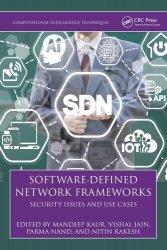Software-Defined Network Frameworks: Security Issues and Use Cases
- Добавил: literator
- Дата: 12-03-2024, 18:43
- Комментариев: 0
 Название: Software-Defined Network Frameworks: Security Issues and Use Cases
Название: Software-Defined Network Frameworks: Security Issues and Use CasesАвтор: Mandeep Kaur, Vishal Jain, Parma Nand
Издательство: CRC Press
Серия: Computational Intelligence Techniques
Год: 2024
Страниц: 325
Язык: английский
Формат: pdf (true)
Размер: 13.8 MB
Software-Defined Networks (SDN) work by virtualization of the network and the Cognitive Software-Defined Network (CSDN) combines the efficiencies of SDN with cognitive learning algorithms and enhanced protocols to automatize SDN. Partial deployment of SDN along with traditional networking devices forms a Hybrid Software-Defined Network (HSDN). Software-Defined Network Frameworks: Security Issues and Use Cases consolidates the research relating to the security in SDN, CSDN, and Hybrid SDNs. The security enhancements derived from the use of various SDN frameworks and the security challenges thus introduced, are also discussed. Overall, this book explains the different architectures of SDNs and the security challenges needed for implementing them.
Software‑Defined Network (SDN) is an emerging approach as a new network innovation architecture that has overcome the limitations of traditional network architecture to adapt to dynamic environments. With SDN, the data plane can be separated from control plane and hence the system abstraction has increased. Defining and understanding the control and management software stack for SDN is indeed important. In addition to centralized network control, the current state of the OpenFlow model which is the well‑known SDN protocol can also be explored. Network Function Virtualization (NFV) is another promising technology with many benefits like easy management and utilization of resources, reduction of the operational cost, and migration of network functions from a dedicated hardware scenario to virtual machines. These benefits have increased the growth of cloud services and applications to run on converged infrastructures. The analysis of SDN contributions for Cloud Computing security becomes an intrinsic part when Network Function Virtualization (NFV) is completely embedded in Cloud Computing. Since the network is automated, it becomes prone to various alerts for security threats. Studying the various security protocols, security analysis and implementation of the SDN Network Security in SDN Environments is crucial. Cognitive Software‑Defined Networks (CSDN) enables the network. In another domain, SDN also augments traditional IP control planes in a wireless area network. SDN architecture also allows applying its features to alleviate the challenges of 5 vs of big data. Some potential SDN solutions address the security issues in big data and also improve the quality of service of applications with big data and SDN.
The major focus of this book is to present the research related to the Cognitive SDN, SDN with Cloud Computing, SDN in WAN, SDN, and Big Data. Software‑defined networking (SDN) is a network architecture approach that makes a network more programmable by separating the data plane from the control plane. This makes the control plane independent. Also, SDN completely changed the problems of traditional IP network architecture, problems such as centralized control is not feasible and switches cannot be configured dynamically, etc. Instead of manual configurations, the SDN works by virtualization of the network giving new levels of visibility, nodes are programmed dynamically. It will also become more intelligent as it assists in setting the rules network. Since the network is automated, it becomes prone to various alerts for security threats. The analysis of SDN contributions for Cloud Computing security becomes an intrinsic part when Network Function Virtualization (NFV) is completely embedded in Cloud Computing. The Cognitive Software‑Defined Network (CSDN) presents to combine the efficiencies of SDN with new cognitive learning algorithms and enhanced protocols to automatize SDN. The combination of SDN and cognitive algorithms acts better to solve the issues in traditional SDNs. In today’s scenario where the data plays an intrinsic role, SDN helps in improving the quality of service of applications working with Big Data. Software‑defined networking defines IP Routing and SDN Route Control mechanisms for controlling the network. The major focus of this book is to present the research relating to the issues, challenges, and opportunities in SDN.
It also emphasizes on SDN‑based Cloud Computing Networking and its issues relating to security. It discusses various tools and technologies that are required for data analysis in cognitive software‑defined networks (CSDN). The simulation tools and experimental testbeds, SDN implications for research and innovation, and potential novel application of Open SDN are discussed.
Features:
Illustrates different frameworks of SDN and their security issues in a single volume
Discusses design and assessment of efficient SDN northbound/southbound interfaces
Describes cognitive computing, affective computing, machine learning, and other novel tools
Illustrates coupling of SDN and traditional networking – Hybrid SDN
Explores services, technologies, algorithms, and methods for data analysis in CSDN
The book is aimed at researchers and graduate students in software engineering, network security, computer networks, high performance computing, communications engineering, and intelligent systems.
Скачать Software-Defined Network Frameworks: Security Issues and Use Cases
[related-news] [/related-news]
Внимание
Уважаемый посетитель, Вы зашли на сайт как незарегистрированный пользователь.
Мы рекомендуем Вам зарегистрироваться либо войти на сайт под своим именем.
Уважаемый посетитель, Вы зашли на сайт как незарегистрированный пользователь.
Мы рекомендуем Вам зарегистрироваться либо войти на сайт под своим именем.
